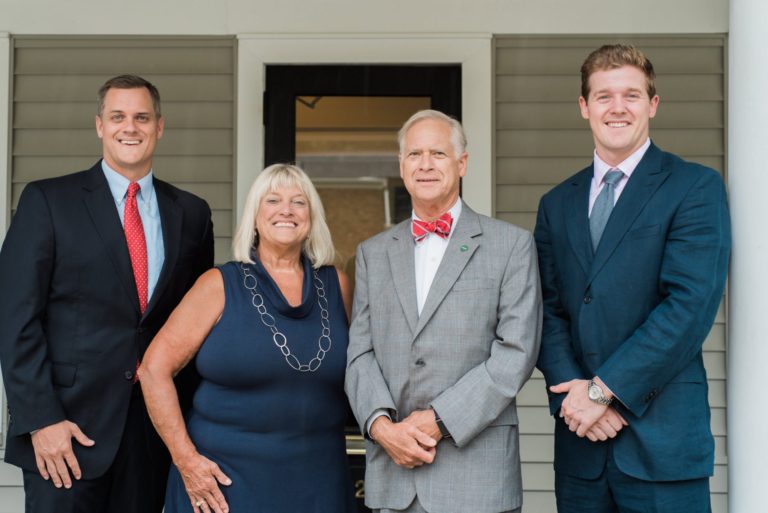5 Emotional Roadblocks that Could Halt a Successful Estate Plan

Estate planning can be an immense blessing to any family at a time of loss. Yet you would be hard-pressed to find any family who would rather sit around the table discussing estate planning than enjoying the day outside. Below I will discuss five of the most common emotional roadblocks individuals face when setting up a successful estate plan and suggestions for overcoming them.
Roadblock #1: Discussing Death
Few persons find talking about one’s own mortality an enjoyable topic, especially in the company of one’s spouse, children, or grandchildren. The reality is, not discussing one’s mortality does not prevent it from happening. Do not sugar coat it, but if you cannot talk about your future “death” with your family, try to use terms like “one day” or “when I’m not here.” Finding other ways to frame your death can help you and your loved ones move past this formidable roadblock and on to thinking more about how to bless your family with the fruits of your labor, creativity, and passion.
Roadblock #2: Inventorying Assets
To craft a successful estate plan, you need to account for every asset. This is not the time to think about who gets what; instead, this is the time to think about the what. If you can, work together with your spouse or a loved one. Start three lists – one, financial assets, the second, physical assets, and the third, intellectual property and digital assets. If like me, you have animals, you might need a fourth list. As you think of the things you own, start jotting them down under their proper column. Once you have a fair amount listed out, you can begin working on the next set of details – breaking down the categories into smaller, more specific subsections and listing the value. Move through this process one step at a time to help reduce the overwhelming feelings that will rise while still making progress toward your estate plan.
Roadblock #3: Working With an Attorney
If you have worked with a trusted attorney in the past, this may not be an issue for you. But for those who need to work with a lawyer for the first time, the search can be intimidating, stressful, and confusing. If you are apprehensive about hiring an attorney, asking friends or family for referrals may be a reassuring step in the right direction. Estate plans do not need to be complex or intimidating. If the attorney you find is not listening, speaking over your head, or you just have a bad feeling about them, pick up your things and go. Having the right attorney will simplify the process and help you understand how you will confer blessings to your heirs, tax benefits for your beneficiaries, and protection over all your assets. Remember this: you are the hero in this story, and your attorney is simply your guide and interpreter.
Roadblock #4: Deciding Who Gets What
Uncomfortable truths can surface when you begin thinking about what should go to whom. Even happy parents and kids with no family issues need to be realistic about the future – what’s the likelihood of this or that happening? You cannot let all the what-ifs stop you from pushing forward in determining who will receive what. If you do not decide, then either a) your beneficiaries will fight over it, b) the courts, or worse, someone you love will have to decide for you.
Roadblock #5: Paying For an Estate Plan
Establishing a successful estate plan does not come cheap. If that keeps you from pushing forward in creating one, it may help to think of it as an investment in conferring your legacy on those who follow in your footsteps and not an expense. Taking the time to work with a professional now will help save your family members from costly tax obligations or other costs associated with dividing up your property. I always say, “Never scrimp on legal or accounting advice.”
These Roadblocks Derailed Dad’s Estate Plan
My father and mother had Wills when they were 40. For almost 40 years, their estate plans were rock solid. But in 1999, Mom died and Dad remarried. He believed his Will was still intact. At the wise suggestion of his second wife, they visited an attorney. Dad made a note in his pocket calendar on that date: “conversation with wife & attorney” is all it said. But every one of the emotional roadblocks above prevented him from actually updating his Will. When Dad died two years later, he died intestate, without a Will. But because he owned property in two states, two states’ probate courts had a say (and conflicting views) on how I should settle his estate. Dad’s surviving wife, my sisters, and I experienced every unpleasant emotion imaginable. Eventually, cool heads and warm hearts prevailed, and we reached the settlement on which we could happily agree.
Discussing an estate plan is no walk in the park, but it may be easier to address when you think about what it truly is – the gift of passing on a legacy in a tax-efficient manner to your loved ones. Do not let these emotional roadblocks prevent you from moving forward in developing a successful estate plan and protecting your loved ones from unintended consequences. Call or drop us a note. We would love to put our hard-earned experience to work for you.







